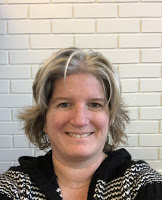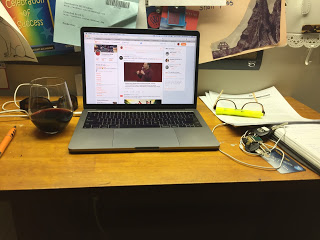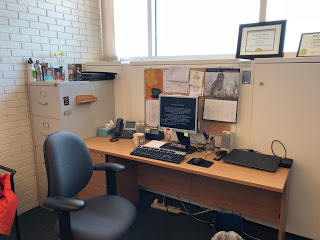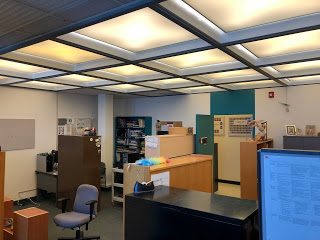I am Kimberley Mitchell, and This is How I Work
 Today, I have the pleasure of inviting Kimberley Mitchell in the “How I Work” series. Kim is a registered nurse and has been an instructor in the nursing department at Red River College in Winnipeg, Canada since 2002 where she has primarily taught the least nursey stuff possible: research methods and academic writing. She also acts as faculty writing mentor and all-round advice giver. Kim is also currently a PhD student at the University of Manitoba in the College of Nursing where she is plotting her doctoral thesis to explore the Theoretical Construction and Measurement of Writing Self-Efficacy. She has designed, completed and published several studies exploring writing self-efficacy in nursing students. In 2016, Kim created the persona and blogs at https://academicswrite.wordpress.com and tweets @academicswrite in order to inspire, share, and create a community of practice related to academic writing, research, and instruction.
Today, I have the pleasure of inviting Kimberley Mitchell in the “How I Work” series. Kim is a registered nurse and has been an instructor in the nursing department at Red River College in Winnipeg, Canada since 2002 where she has primarily taught the least nursey stuff possible: research methods and academic writing. She also acts as faculty writing mentor and all-round advice giver. Kim is also currently a PhD student at the University of Manitoba in the College of Nursing where she is plotting her doctoral thesis to explore the Theoretical Construction and Measurement of Writing Self-Efficacy. She has designed, completed and published several studies exploring writing self-efficacy in nursing students. In 2016, Kim created the persona and blogs at https://academicswrite.wordpress.com and tweets @academicswrite in order to inspire, share, and create a community of practice related to academic writing, research, and instruction.
General:
Current Job: Instructor, Red River College
Current Location: Winnipeg, MB Canada
Current mobile device: iPhone 8+
Current computer: MacBook Pro
Can you briefly explain your current situation and research to us?
I am a doctoral student at the University of Manitoba in Winnipeg, Canada. My home department is nursing as I have been a registered nurse since 1997 and working in nursing education at a teaching focused institution since 2002 shortly after I finished my Masters degree. It took me this long to do my PhD (I started in 2016) only because I didn’t need it and I was enjoying life and the ample free time my flexible job allowed me. But the research bug crept back into my life around 2011. The most common question I get related to my nurse educator status is: “Did you ever do “real” nursing?” To which I tell them that what I do is REAL nursing, educating the future practitioners, but I did practice in a hospital for 5 years after my nursing degree and worked in Cardiac and Vascular surgery and Intensive Care. As an educator, I taught academic writing in our department from 2005-2015 and I have been teaching research methods since 2007.
In 2011 I decided that since I had developed this first year writing course for our nursing students that I should start collecting evidence as to if it was successful. I decided to focus on writing self-efficacy. I’ve done 3 studies on my local student population related to writing self-efficacy, developed an instrument, and did an analysis of all the writing self-efficacy instruments that have been used in research. These studies taught me that to increase my knowledge, the only solution was to do my PhD. My PhD focus is nursing education. I am carrying on with work in writing self-efficacy and re-developing my instrument to measure it and doing some other philosophical work in that area as well.
What tools, apps and software are essential to your workflow?
Microsoft office. I write. A lot. So my main tool is Word. But I also make use of Exel for data entry and I’ve been learning SPSS and most recently Rstudio for doing latent variable analysis.
What does your workspace setup look like?
I alternate between home and office. Currently, as I type, I am at my Red River College office but I have a PC laptop here which I hate. I much prefer working on my Mac. My workspace is really uninteresting as it is just a desk and a computer and not much of a view.



What is your best advice for productive academic work?
I am known for being extremely efficient and productive. And I don’t really know if I have any tips for anyone that would actually work for them. I just do what I do and I don’t think about it a whole lot. I never stop thinking. I just don’t procrastinate. I mean, I do procrastinate but I really consider that ‘thinking time’ rather than procrastination. I’ve put off duties like writing up assignment guidelines, for example, and then when I sit down to write them out, I can hammer out a first draft in about 30 minutes because the whole thing is usually pre-written in my head. That doesn’t necessarily work for academic writing.
I am very old school in my paper writing practices. I read paper copies of articles. I take handwritten notes of those articles. I thematically analyze the articles as I am taking notes often because my ideas form during reading and then are transformed and thickened by writing.
I’m very efficient. I look for the quickest way to get things done and I tend to not dither over decisions. All things that are truely time saving. My brain just “sees” how things should be organized before I go to organize it and it helps me to work faster.
I work very independently. Meaning, I know some folk that can’t seem to make a decision or implement a change without checking in with someone or getting approval. I don’t need any of that. I do what I do and I face the consequences later if I’ve done something inappropriate — which is both often, and rare at the same time. There… those are my productive work paradoxes.
How do you keep an overview of projects and tasks?
Mostly in my head. I know what I need to get done and when it needs to get done by and I tend to only work on 2 things at a time. I do have a magnet board with some listed papers I would like to tackle but it is kind of outdated right now. I mentally block off time to complete a particular task.
For example, I have a factor analysis paper I want to write about my original questionnaire and I hope to have it done by mid April. I have three papers at journals right now in various stages of the review process. I have a systematic review I am working on unrelated to my PhD life that is being conducted with work colleagues and that one will go out before the end of the month. I have a educational innovation paper I wrote on a whim last week and I would like to have that one submitted before the end of the month too but it is the second priority from the systematic review. I have another paper I want to revise but I’m still percolating on. I had a meeting last week about team writing an editorial but that is usually a day of writing and it is collaborative writing so less time consuming overall. I’m involved in about 4 research projects as a team member all in various stages of completion. So I may have lied when I said I only work on 2 projects at once. I have about 11 I am involved in but really only 2 sit at the top of the priority list on any given day and I only allow 2 of them to “call for my attention” at any given time. It’s complicated but all academic life is complicated and I am pretty sure that is normal.
Besides phone and computer, do you use other technological tools in work and daily life?
Nope.
Which skill makes you stand out as an academic?
My efficiency and my writing skills. I’m not a perfect writer. No one is. But I have a thorough metacognitive understanding of writing. I can diagnose writing issues easily. Mostly other people’s writing issues. With my own writing issues, I tend to have a bit more trouble. Also because I have been teaching research methods for 11 years, I have a very well honed understanding of a variety of research methods.
What do you listen to when you work?
I rarely listen to anything but when I do it is usually whatever is on my iPhone in iTunes which is mostly 90s grunge or sappy pop from the same era.
What are you currently reading? How do you find time for reading?
I have two books going at once at the moment. Both are things that I don’t “have” to be reading but yet neither is pleasure reading. One is William Zinsser’s On Writing Well and the other is Connelly and Clandinin’s Narrative Inquiry. Nursing is a very article based discipline so I am finding it a tough conversion to look at books. Most of the classic writing literature is in book form not in article publications. Because I am taking a measurement course right now, I am also reading a lot of Exploratory and Confirmatory Factor Analysis Studies.
Are you more of an introvert or extrovert? How does this influence your working habits?
I’ve done the Myer’s Briggs surveys numerous times and I sit right on the border of Introvert and Extrovert so the answer changes depending on my mood. I’m not shy but I do have social anxiety. My extroverted side was out in full force yesterday at the office where I talked several people’s ears off till I think they wanted to get rid of me. But I could also quite happily live in the forest on a lake and never see people for days on end and be lost inside my head writing. When I was writing as a young adult, I could often be swayed away from the pen by a phone call from a friend saying, “Hey let’s go out!” That’s probably why I never finished any of the writing I started at that age. I could easily be pulled away from it to socialize. Now in my 40s I would be more likely to say, “no thanks, I need to write.”
What’s your sleep routine like?
My ideal biorhythm is from about 9 am to 1 or 2 am but I often don’t get to live up to that. But I rarely work past 8 PM. I never work in the middle of the night or early in the morning. I am in bed by 10 or 1030 and lights out by 11. My partner has a strict routine and it is a good relationship practice (especially in my busy PhD student life) to go to bed at the same time so I follow his routine. But I could easily sit up and write till 1 or 2AM. When I wrote my novel that’s what I did and because of it I started drinking coffee at the age of 35. But the only time I could write was when my children went to bed and I had rare children who slept and were in bed by 7PM so it worked. They were about 5 and 3 at that time. The writing got done from 7PM until I hit a brick wall. The house didn’t get cleaned. It ended my marriage. But I was writing and it was one of the happiest times of my life.
What’s your work routine like?
There is a lot of talk on Twitter on work-life balance which I respect but I find it doesn’t work for me to have strict “I only work from 9-5” rules to structure my work life. I work when my head is in that head space and I don’t when it isn’t. I’m not a pleasant person to be around if I have some writing or other task itching in my brain and I’m being kept from it by some obligation or other mundane task. I find my best work hours are between 10AM and 8PM. I don’t watch much TV. My work routine can only be described as unpredictable.
I live outside of the city of Winnipeg which means about a thirty minute to one hour commute to get to work or to get to school. Sometimes I work at home — whenever I can but that is not often these days. I teach 2 days a week currently and those days are spent at my Red River office. I usually have to be at the university for some student related activity for minimum one other day of the week. I will set up office in the grad lounge on those days or the research office depending on what needs to be done. My kids don’t go to school in the town I live in, so they get driven into the city with me which often means I do a split work day. My office hour time is done by about 3PM and then I drive to pick up the kids and do grocery shopping and run errands and take them home. The kids are 16 and 14 now. Then I work for another hour till dinner, and, many evenings, after dinner for another couple hours.
I work when work calls, and I do life when life calls. sometimes that means working all evening or weekend and sometimes that means going for a three hour bike ride at 10AM on a Tuesday morning. As long as deadlines are met, I don’t tend to fret about it much. I don’t much let a clock dicate when either happens. The writing muse doesn’t always appear because a clock says it should. And sometimes life needs to happen at 10AM instead of at 5PM. (editors note: sometimes there are spousal complaints). It is a crazy work life but it works for me. It is hard to describe to others. My solice is in the fact that at my current job I have 44 days of vacation a year to use and I tend to do nothing but leisure time, and read, most of the summer.
What’s the best advice you ever received?
I don’t know if this falls in the category of advice per se, but I’ve been teaching undergraduate nursing for 15 years and I had a mentor for the first 12 of those who was in the same office as me (before she retired) who really inspired my approach to learning. As the writing instructor we had many conversations about plagairism and she was also the adminstrator who had to have conversations with students when their assignments were suspected plagiarism. She always used to say, “Would we rather be police? Or would we rather teach?” And the first time I heard her say that it changed my thinking. Of course I would rather teach! I changed my pedagogial choices after that. I really don’t think much about or every go hunting for plagiarism. Students are less likely to plagiarise if you are in their face about their writing process. So find a way, in every assignment, to make sure that every one of your students has to look you in the eyes with respect to their writen work.
